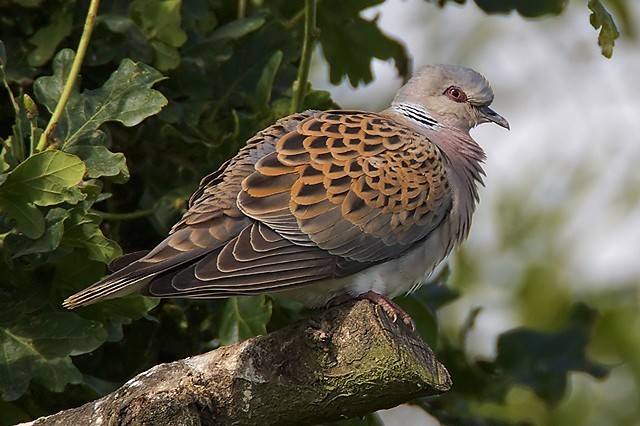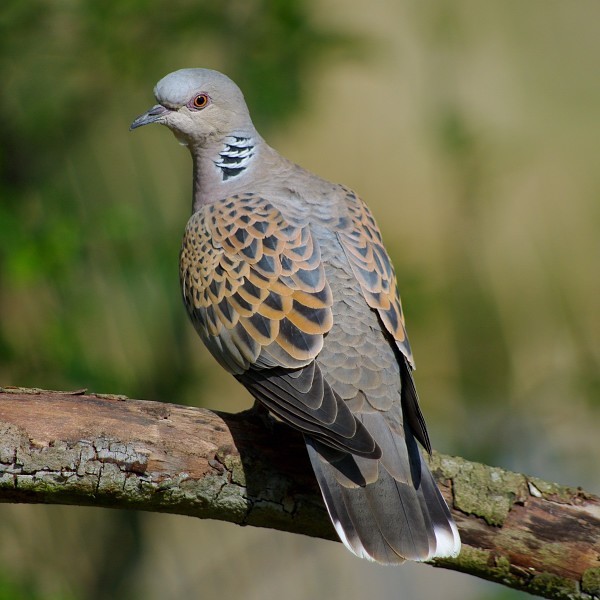Two Turtle Doves this Christmas? You’ll be lucky!
If you're expecting a gift of two Turtle Doves from your true love this Christmas, don't hold your breath. The famous carol would have us give the present on the second day of Christmas. But Turtle Doves are becoming such a rare visitor to the UK that baffled scientists are urgently trying to find out why the population is crashing.

Turtle Dove, Otmoor RSPB, Oxfordshire (Photo: Nigel Forrow)
The RSPB has dispatched a group of scientists to the birds' winter home in Africa, to look at declining migrants like Turtle Doves. The dainty farmland bird is disappearing at such a rate that researchers fear it might disappear from Britain for good in the next ten to twenty years.
"In reality, Turtle Doves have never been in the UK at Christmas, as the birds migrate to Africa each September. But the diminishing number that return to Britain in May each year is causing great concern among wildlife scientists," says the RSPB's Dr Will Peach.
Turtle Doves were once so widespread that, as well as the world-famous Christmas song, they appear in work by Shakespeare, Edmund Spenser, and even Buddy Holly. But Turtle Dove numbers Song Thrush, Tree Sparrow and Reed Bunting, have stabilised after periods of rapid decline, although they remain species of conservation concern. But the turtle dove's decline shows no sign of slowing down.
What's baffling scientists is that even on farmland managed for wildlife, the Turtle Dove is still disappearing fast. The RSPB and Natural England now urgently want to test methods to improve the breeding success of Turtle Doves in Britain. The organisations hope to secure funding for a research project to try to improve their breeding success on farmland by providing plenty of food and nesting habitat.

Turtle Dove, Tetney Lock (village), Lincolnshire (Photo: Dave Bradbeer)
Dr Will Peach says: "Turtle Doves feed almost exclusively on weed seeds, unlike many other farmland birds that feed insects to their young. But to date, wildlife-friendly farming practices do not appear to have helped. We need to know why this is, so we can develop appropriate advice for the many farmers who we're sure would want to help the Turtle Dove."
Previous research carried about by the Game and Wildlife Conservation Trust (GWCT) suggests a lack of weed seeds and spilt grain on modern farmland is preventing Turtle Doves making as many breeding attempts as they have in the past: less food means they are less well prepared for the demands of raising a family. Another possible cause of population decline could be a loss of nesting sites. Turtle Doves nest in tall, mature hedgerows, many of which were destroyed during the 1970s and 80s.
As well as the situation in the UK, the latest research will investigate the potentially hostile environment of their wintering grounds, which could be having an effect on overall populations. Little is known of what happens to the birds once they've flown over the Sahara desert. But researchers from the RSPB and the BTO are currently in Africa, trying to learn more about the birds' requirements and behaviour. Habitat loss or crop failures in sub-Saharan Africa might be reducing the numbers of birds that survive through the winter. Another possible cause of the decline could be mortality caused by hunting. Turtle Doves migrate over countries like France, Spain and Malta on their way to Africa where they can be legally shot during autumn.
Dr Will Peach says: "It's ironic that we sing about the Turtle Dove at Christmas, as the reality is the bird is many thousands of miles away enjoying some winter sunshine. This is part of the natural cycle of migration. But what is extremely worrying is the dwindling numbers of Turtle Doves that return to Britain each spring. We've already lost 85% of the population. We need financial support for a research project that will test ways to help Turtle Doves raise more young on British farmland."

Turtle Dove, High Vinnalls, Herefordshire (Photo: George Ewart)
Peter Thompson, farmland biodiversity adviser with the Game & Wildlife Conservation Trust, said: "A previous study carried out by the Game & Wildlife Conservation Trust showed that the dramatic changes in the size of the British Turtle Dove breeding population were not due solely to habitat loss but were caused by overall degradation of habitat quality and reduced seed food availability. Turtle Doves today have a shorter breeding season and produce about half the number of clutches per pair than formerly and this would lead to an annual population decline of 17%. Our study suggests that the recovery of Turtle Doves in Britain is perhaps dependent on the provision and sympathetic management of both nesting and foraging habitats, but more research needs to be undertaken in order to secure the future of this vulnerable breeding bird in this country."
Phil Grice, Natural England's Senior Specialist in Ornithology, said: "Environmental Stewardship schemes will be the key tool for providing the right conditions for Turtle Doves to thrive on our farmland. Research is urgently needed so that we are sure to provide the right land management for the species across its remaining breeding range in Britain."

